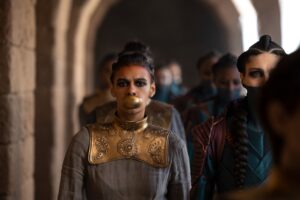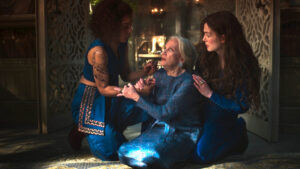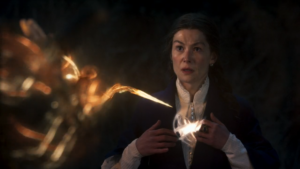MAJOR SPOILERS FOR THE WHEEL OF TIME SEASON TWO AND BOOKS ONE THROUGH FOUR, AHEAD!
The Wheel Of Time recently aired its second season finale, and fans of the epic fantasy series are eagerly looking forward to season three, currently filming in South Africa. So I thought I’d put together a list of the top ten things I’m most excited to see in season three, based on the fourth book in the original series of novels by Robert Jordan. The Shadow Rising, which picks up roughly around the same point in the narrative where the second season ends, is widely considered Jordan’s best book, features some of the most iconic scenes and sequences for which the series is known, and gives nearly every character a strong arc. Let’s jump right in, shall we?

10: Gawyn and Galad and Morgase
Whether due to time constraints or a deliberate choice by the writers to avoid attracting comparisons to Game Of Thrones, The Wheel Of Time has only briefly touched on the complex political situation in the Westlands, going no further than vaguely referencing nations and their monarchs: but politics become increasingly important as the book series progresses, particularly for Elayne Trakand and her family, who have for generations ruled the largest nation, Andor (which encompasses the Two Rivers region, where the story began). In the first book of the series, The Eye Of The World, it’s in the Andoran capital city of Caemlyn, rather than in Tar Valon, that Rand al’Thor reunites with his friends after being separated in Shadar Logoth, and there he meets for the first time Elayne, as well as her brothers Gawyn Trakand and Galad Damodred, and her mother Queen Morgase Trakand (and Morgase’s Aes Sedai advisor, Elaida; more on her later). In season three, with civil war brewing in Andor, these characters will become crucial at long last. They’re low on my list, however, because I detest Gawyn (shocking, I know), I have no strong feelings towards Galad whatsoever, and while I like Morgase, it’s evident that Robert Jordan never figured out exactly what he wanted to do with her, and both he and his successor Brandon Sanderson kept her pointlessly meandering about for a ridiculously long time. Hopefully the show can do better by all three of them.
9: Return of Thom
You probably wouldn’t guess it from how the adaptation has handled his character, but Thom Merrilin, the grizzled traveling bard or “gleeman” that Rand and Mat Cauthon briefly traveled alongside in season one, is one of the main characters in the books. After seemingly being killed by a Fade in The Eye Of The World, Thom reappears in Cairhien during the events of The Great Hunt, shares a few scenes with Rand, and dips out of the story to assassinate King Galldrian for reasons of his own, unintentionally plunging Cairhien into a civil war of its own. It may be that Thom was supposed to do something similar in season two, which would explain why Galldrian was name-dropped several times only to never actually appear, but whatever happened there, Alexandre Willaume ended up having scheduling conflicts with the now-canceled Netflix series 1899. Season three, for which he will finally return to the role, should find the gleeman in his The Shadow Rising storyline, escorting Nynaeve al’Meara and Elayne to Tanchico.
8: Faile
The hunt for the Horn of Valere was very nearly a wasted subplot in season two, but at least now the groundwork has been laid for the introduction of the most famous Hunter for the Horn, Faile Bashere. The thrill-seeking runaway princess of Saldaea first appears in The Dragon Reborn, traveling with a party of Hunters each hoping to win fame and glory for themselves by being the one to recover the fabled Horn and bring it to Illian. Perrin Aybara runs into her in the same small town where he frees an Aiel from a cage and makes an enemy of Whitecloaks, but seeing as that scene already played out quite differently in season two, the setting and circumstances of their meeting will obviously have to change in the show. Faile is a complex and flawed character who, by a supremely unfortunate accident, is presented to the reader from Perrin’s point-of-view before her own. He, like so many of Jordan’s male characters, regards all women as exasperatingly incomprehensible, and treats her with a kind of patronizing affection that only enrages her, leading him to become more confused, and so on and so forth. Their inevitable romance is not much fun to read about. I hope and pray with all my heart that the show does away with most of the miscommunication between them, including every instance of Perrin trying to figure out what Faile is thinking or feeling by smelling her. Ick.
7: The Battle of Emond’s Field

Having just put book Perrin on blast, let me clarify that show Perrin has done nothing wrong in his entire life, and behind Egwene al’Vere and Nynaeve al’Meara, he is indeed my favorite of the Emond’s Field Five (technically, that holds true for the books as well, but book Perrin trails the two women by a much larger margin and it says a lot about how much I don’t care for either Rand or Mat in the books that they’re still behind him despite that). Reaching and maintaining a balance between the wolf and the man within himself has been Perrin’s greatest challenge. He first wanted nothing to do with the wolves, perceiving them as manifestations of his worst instincts, and that resulted in failure. In season two, he took steps to learn about and embrace being a Wolfbrother, which led to the death of Geofram Bornhald at his hands. He needs to make peace with himself, and that will only happen when he finally comes to terms with what happened to Laila, his wife, in season one. Returning home to Emond’s Field in the Two Rivers will provide him with that necessary closure, and it just so happens that’s exactly where his The Shadow Rising storyline takes him (and Loial, Faile, Bain and Chiad). Much has changed there since he left, however, and Perrin will find himself reluctantly leading an uneasy coalition of Two Rivers folk, Whitecloaks, Tuatha’an, and Aes Sedai to repel an army of Shadowspawn led by the mysterious “Slayer”, an amalgamation of souls bound to the Dark One, in the Battle of Emond’s Field. If done well, this could be what ensures a fourth season for The Wheel Of Time all on its own – it’s that epic.
6: The Aiel Waste
Though his destiny does not lie in the Two Rivers, season three will be a homecoming of sorts for Rand as well. At the beginning of The Shadow Rising, he learns that he must go to the Three-fold Land (called the Waste by outsiders) beyond the Spine of the World, and there reconnect with his heritage as a long-lost son of the Aiel, the nomadic warriors who have lived in the Three-fold Land since the Breaking of the World, adopting a unique and complex system of honor and debts called ji’e’toh that informs nearly everything they do. Rand, like the spear-maiden Aviendha introduced in season two, belongs to the Taardad Aiel, one of twelve clans further divided into dozens of individual “septs” – his the Iron Mountain, hers the Nine Valleys. Each clan has a chief and a governing body of Wise Ones (the Aiel equivalent to the Aes Sedai of the Westlands), and to become either of these things means venturing alone into the ruins of Rhuidean, a city built shortly after the Breaking of the World by the now-extinct Jenn Aiel, glimpsing visions of the past through the glass columns ter’angreal, and returning burdened with the knowledge of where the Aiel came from, who they were, and what they did to become what they are now. Men who pass the test (and only men, because…sexism, mostly) come out bearing a dragon tattoo on one arm. As you can probably guess, Rand will have to undergo this test and experience for himself what awaits in the glass columns.
5: The Sea Folk
While I know I’ll hear some grumbling about their placement on this list over the Aiel and the Battle of Emond’s Field, I absolutely adore the Sea Folk, and I was overjoyed to learn that showrunner Rafe Judkins evidently does as well, from how he excitedly teased their introduction in season three at New York Comic-Con. The Sea Folk, or Atha’an Miere, are a seafaring people (obviously) who live on ships in the Aryth Ocean, making landfall in the Westlands very rarely except to trade their priceless porcelain and goods from the land of Shara in the east. Their elected leader is named the Mistress of the Ships, and rules alongside a Master of the Blades, often her consort. When the story opens, the Mistress of the Ships is Nesta din Reas Two Moons. Among the Atha’an Miere, most women who can channel do not go to the White Tower to become Aes Sedai but instead act as “Windfinders”, using secret weaves of Air and Water to calm the oceans, alter the weather, and turn the winds in their favor, propelling their peoples’ ships further and faster around the world. As a rule, the Atha’an Miere do not allow Aes Sedai passage on their ships for fear that their Windfinders will be found out. However, in The Shadow Rising, Nynaeve and Elayne negotiate with the Sailmistress Coine din Jubai Wild Winds to take them and Thom to Tanchico onboard the raker Wavedancer, and the two women cross paths with the Atha’an Miere regularly after that.
4: Elaida’s Coup

I told you we would circle back to Elaida eventually. Elaida do Avriny a’Roihan of the Red Ajah is one of The Wheel Of Time‘s great antagonists, more enduring and more efficient – if only by sheer accident – than any of the Forsaken in the books, dividing the White Tower against itself at a time when it needs to be whole, and driving a wedge between Rand and the Aes Sedai. In The Shadow Rising, Elaida discovers evidence of collusion between Siuan Sanche and Moiraine Damodred to secretly assist the Dragon Reborn, something so antithetical to the Red Ajah’s entire philosophy that Elaida has no choice, as she sees it, but to orchestrate a coup against Siuan and ascend to the Amyrlin Seat herself, in a last-ditch effort to save the world. The fact that she genuinely believes she’s doing the right thing makes her all the more dangerous, because there’s no reasoning with her. Of course, in season two, Siuan was uncharacteristically written to share many of Elaida’s opinions on how to handle the Dragon (seemingly, at least), and the Aes Sedai all saw her try to shield and cage Rand before he escaped with Moiraine, so Elaida will have a much harder time convincing them that Moiraine and the Amyrlin are working together, but that will hopefully only make Elaida even more compelling, if she’s positioned as the underdog. The Wheel Of Time is lucky to have Oscar-nominated actress Shohreh Aghdashloo (unofficially) onboard to play this phenomenal character in season three and beyond.
3: Black Ajah
One of the major plot twists in season two involved the so-called “Black Ajah”, a faction of Aes Sedai that, far from being loyal to the Amyrlin Seat, are secretly sworn to the Dark One and have strived for decades to destabilize the institution of the White Tower from within. I will say that the early books in the series did more with the Black Ajah than the first two seasons of The Wheel Of Time, and I would have liked to see some reference to how they carried out the assassinations of various Aes Sedai over the years, including the Amyrlin Seat before Siuan and every other searcher for the Dragon Reborn besides Siuan and Moiraine (not for lack of trying). But the Black Ajah will have a more prominent role in season three, as antagonists to Nynaeve and Elayne in the coastal city of Tanchico. In the books, Liandrin brings her Darkfriends there to steal a version of the Seanchan a’dam designed specifically for male channelers, hoping to use it on Rand. Seeing as that particular storyline kinda goes nowhere in the books, it’s entirely possible the circumstances will change, but either way Rafe Judkins has assured us that from the get-go, we’ll know what Liandrin and the Black Ajah have been up to.
2: Tel’aran’rhiod
Tel’aran’rhiod, the “Unseen World” or “World of Dreams” as it is more often called, refers to the infinitely vast, intangible yet treacherous labyrinthine dimension accessible through dreams, which encompasses and connects all of the alternate realities brought into being over the course of the Wheel of Time’s turnings. It was the setting of some particularly memorable sequences in season two: Nynaeve stepping through a stone archway ter’angreal into a version of the world where she left the White Tower to be with Lan; Ishamael and Lanfear casually infiltrating each other’s dreams, and exerting their mastery over Tel’aran’rhiod to manipulate the environment around them; Lanfear taking Rand to see Egwene while they were both asleep, with hundreds of miles between them. It’s a place where the protagonists are immediately out of their depths and at a disadvantage compared to their centuries-old opponents, but that’s all about to change in season three. Egwene and Perrin are both “Dreamwalkers”, and equally powerful there as any of the Forsaken, though their two paths could not be more different. Egwene is on her way to the Waste to learn from the Aiel Wise Ones, while Perrin will delve into the Wolf-dream, where wolves dead and alive congregate (whether the wolves will talk in Tel’aran’rhiod, as they do in the books, remains to be seen). However, it’s Nynaeve, not a Dreamwalker, who will soon face the greatest opponent lurking in the World of Dreams.
1: Moghedien

Coming in at number one on my list is Moghedien, which might be confusing to some as she is widely regarded to be the weakest of the Forsaken in physical strength. But this small and slight villain, played by Laia Costa in the final minutes of season two, takes her name from a species of inconspicuous spider with a fatal bite discovered during the Age of Legends, and uses similar tactics, silently stalking her prey from the safety of Tel’aran’rhiod, waiting until their guard is down before delivering one decisive strike and retreating back into the shadows whence she came. In the World of Dreams she is more experienced than any of the Forsaken, even Lanfear, and to challenge her there, on her territory, is nothing short of suicidal. Her sprawling webs ensnare even the wariest Dreamwalkers, and once you’re tangled up in them, there’s no escape.
Well, that’s my totally subjective ranking of the top ten things I’m most excited to see from The Wheel Of Time season three. What’s yours? Share your own thoughts, theories, and opinions, in the comments below!








